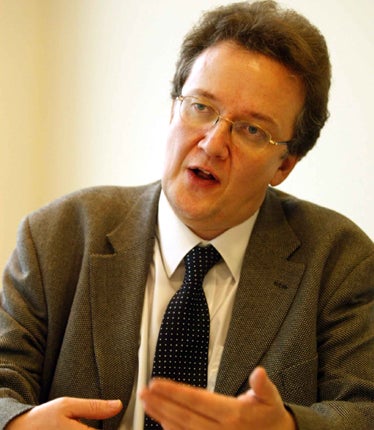Former prisons chief blasts ‘panicky’ response to overcrowding crisis
Emergency proposals to ease capacity do not solve ‘fundamental problem’ of prisons crisis, a former prison chief inspector has warned
A former chief inspector of prisons has accused the government of announcing “panicky” measures to tackle the prisons capacity crisis.
Nick Hardwick, now a professor of Criminal Justice at Royal Holloway University, has called for a radical rethink to save the creaking justice system, which sees inmates trapped in squalid, overcrowded conditions in their cells for 23 hours a day.

Prisons are so full justice secretary Alex Chalk announced a series of emergency proposals in October, including releasing some prisoners early and controversial proposals to rent prison space overseas.
Writing exclusively for The Independent, the former HM Chief Inspector of Prisons from 2010 to 2016 said the measures do not solve the fundamental problem that prisoners are serving longer sentences, with terms up 5.4 months on average since 1993.
He said: “The latest government forecast now predicts the prison population will rise to 94,400 by March 2025 and up to 106,3000 by March 2027. The government’s long-term strategy is to build an addition 20,000 prison places at a staggering capital cost alone of £4 billion.
“But prison building has not kept pace with the speed of the population increases and so when the system finally ran out of room back in October, Alex Chalk, one of the better Justice Secretaries we have had in recent years (it was not a problem of his making) announced a series of frankly panicky measures to create some space.

“These ranged from releasing some prisoners up to 18 days early, delaying sentencing for some convicted prisoners and installing temporary prefabricated cell units in a few prisons where there was the physical space to do so.”
Although he welcomed proposals to suspend most short prison sentences as “sensible”, he said: “The reason for the increase in the prison population is not that we are sending more people to prison but that we are sending people to prison for longer - if you think of it like a bath, the water is coming in at the same rate but the outflow is blocked so the bath fills up and simply scooping some of the water out does not solve the fundamental problem.”
He issued calls for a proposed Prison Capacity Statement to be binding, so when capacity is reached convicts have to wait to serve their sentence or others are released in early. He also suggested a Citizens Assembly should be formed to help the government navigate the issues around prison capacity and sentencing.
His comments come as he gave evidence to MPs with other prison experts on overcrowding.
Rob Allen, an independent consultant on Prisons, Probation and Youth Justice, told the Justice Committee that he was “flabbergasted” that the government was treating housing prisoners overseas as a “serious proposal”, with no plans as to how the prisons will be managed and inspected or for families to be able to maintain contact.
“Frankly I don’t think it’s really a very legitimate way of running a penal system to transfer people in that way,” he told MPs.

Richard Garside, director of The Centre for Crime and Justice Studies, added: “I am not sure that it’s actually a serious proposition….it doesn’t mean they can get away with obligations nationally and internationally towards prisoners in terms of human rights.
“If I was trying to find 300 places in the prisons system I can certainly think of better ways and cheaper ways and more effective ways then ending up offshore.”
He called for the government to look again at thousands of unreleased inmates languishing under now defunct imprisonment for public protection (IPP) sentences, many of which have served more than a decade longer than their minimum tariff.
“If the government would just do something rather more energetic to expedite the release of IPP prisoners who are over tariff I think that would have quite a big impact on the prison population quite quickly,” he added.
Mark Day, of the Prison Reform Trust, told the hearing renting space overseas was an “expensive and complicated” way of increasing prison capacity.
He said there were “practical, moral, ethical questions about whether its right that we should be sending people from UK jurisdictions to other countries.”
“I think it’s quite an extraordinary proposal yes and I do question how serious the government really is about pursuing it.”
A Ministry of Justice spokesperson said: “Public protection is our priority which is why we’re keeping the most dangerous offenders behind bars for longer while reforming short sentences and getting more prisoners into work to help break the cycle of reoffending.
“We’re also creating an additional 20,000 modern prison places – the biggest prison expansion programme since the Victorian era – with over a quarter already built, helping to rehabilitate offenders and keep our streets safe.”
Bookmark popover
Removed from bookmarks